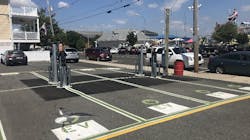NJ Transit to pilot electric bus program with VW settlement funds
The New Jersey Department of Environmental Protection (DEP) has allocated $11.2 million to install hundreds of charging outlets for electric vehicles across the state and purchase eight new electric buses for New Jersey Transit to operate in the city of Camden.
The projects are the first to be announced for funding from the Volkswagen Mitigation Trust, from which New Jersey is receiving $72.2 million. DEP is evaluating more than $400 million worth of project applications and expects additional awards to be finalized before the summer. In reviewing additional funding applications, the DEP is focusing on reducing smog, as well as greenhouse gas emissions, expanding the use of electric vehicles and advancing environmental justice goals by using electric public transit buses, school buses and other zero-emission vehicles in communities that disproportionately bear the burden of air pollution.
New Jersey Gov. Phil Murphy has committed to using 15 percent or $10.8 million of the state’s VW settlement amount for electric-vehicle charging stations.
“We are committed to growing charging infrastructure across New Jersey and making it easier for the public to help us improve air quality by using zero-emission vehicles,” Commissioner Catherine R. McCabe said. “The new buses in Camden will be beneficial in helping to reduce harmful emissions that contribute to smog. Better air quality means better health for our communities and residents.”
The DEP will use $3.2 million to award grants for approximately 827 charging outlets at 533 charging stations under It Pay$ to Plug In – New Jersey’s Electric Vehicle Charging Grant Program, more than doubling the number of non-residential charging outlets in the state. Charging stations also will be installed at select NJ Transit commuter rail stations and at rest stops along the Atlantic City Expressway.
The DEP has allocated $8 million to purchase eight new electric transit buses to be operated in Camden; the buses will represented a pilot project to aid NJ Transit to begin its electric bus program.
“The DEP is excited to work with NJ Transit on this pilot project and looks forward to adding electric buses to the remainder of the fleet,” said Paul Baldauf, assistant commissioner for Air Quality, Energy and Sustainability. “Providing the residents of Camden and surrounding areas with access to clean transportation, in addition to adding more charging stations around the region, is a priority.”
“We are pleased that this funding will help us pilot an electric bus program here in New Jersey to study in real-world scenarios the benefits and challenges of utilizing this alternate energy source,” said NJ Transit Executive Director Kevin Corbett. “Part of the NJ Transit goal of providing world-class transportation services is to do so through the lens of environmental responsibility. By investigating the possibilities of alternate energy sources, we can advance our commitment to sustaining clean air throughout the state.”
Ground-level ozone levels in New Jersey have been improving in recent years and the state continues working to meet federal health-based standards for the pollutant. The DEP explains that the process is difficult, because New Jersey is heavily urbanized and in the middle of one of the nation’s busiest transportation corridors. The department also notes that the state is impacted by smog transported by prevailing winds from older, dirtier power plants in upwind states.
About the Author

Mischa Wanek-Libman
Group Editorial Director
Mischa Wanek-Libman is director of communications with Transdev North America. She has more than 20 years of experience working in the transportation industry covering construction projects, engineering challenges, transit and rail operations and best practices.
Wanek-Libman has held top editorial positions at freight rail and public transportation business-to-business publications including as editor-in-chief and editorial director of Mass Transit from 2018-2024. She has been recognized for editorial excellence through her individual work, as well as for collaborative content.
She is an active member of the American Public Transportation Association's Marketing and Communications Committee and served 14 years as a Board Observer on the National Railroad Construction and Maintenance Association (NRC) Board of Directors.
She is a graduate of Drake University in Des Moines, Iowa, where she earned a Bachelor of Arts degree in Journalism and Mass Communication.
